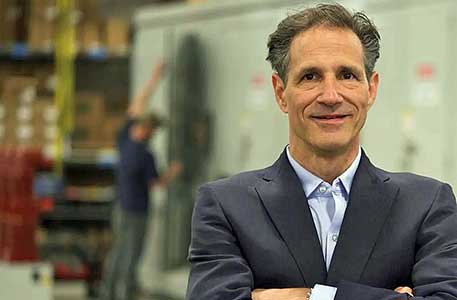Reactive power solution giant NEPSI benefitting from industry-first MV circuit breaker for complex challenges of capacitive load switching.
In its unwavering commitment to driving innovation through better industry collaboration, ABB recently went beyond the role of valued partner to develop a new product to meet the specific technical challenges of reactive power solution giant, NEPSI.
Founded in 1995, NEPSI (Northeast Power Systems Inc.) is widely recognized as the world’s leading supplier of Medium-Voltage (MV) reactive power solutions. Based in upstate New York, NEPSI’s innovative systems have been used in over 1000 project locations worldwide, serving a range of industries including renewables, mining, oil & gas, chemical, electric generation and distribution.
Over recent years, NEPSI had seen a sharp growth in the capacitor bank market on account of soaring electricity demand and greater regulatory focus on reducing existing line loss.
But the team faced a major challenge in the lack of a dedicated circuit breaker solution to meet the technical challenges of capacitive load switching. Alongside this, the number of vendors supplying switches at the High-Voltage level (38kV) required for renewables was limited and the lead times were long.
As a result, NEPSI had come to rely on a combination of standard circuit breakers supported with transient inrush reactors, sometimes as many as ten, to manage the magnitude of inrush associated with back-to-back load switching in renewables.
Still, this approach posed challenges. Without full control of the unpredictable levels of inrush involved, there was scope for disturbances to the power network during sudden bursts, along with the potential tripping of relays due to noise.
In some cases, this could cause damage to assets, the premature aging of products and incur financial penalties for compromising energy stability – not to mention the extra cost implications of the inrush reactors.

It was this very issue which became the topic of conversation between NEPSI and senior executives from ABB’s Distribution Division, at an ABB customer event held in the United States in 2019.
Paul Steciuk, President and Senior Engineer, NEPSI explains: “Many system designers struggle with the challenges inherent with driving loads that are capacitive in their nature. This is due to the magnitude of inrush of current involved, which can be difficult to estimate and exceed the standard breaker tolerance. In some cases, the inrush current can damage devices and even impact power quality and reliability of the network.
“Without a dedicated switch device to address this, we were managing it by using inrush reactors. However, this was not a fool-proof solution, and it was expensive and cumbersome too, given the space needed to house these types of devices.
“During that conversation with ABB they asked me ‘what product do you need to enhance your business?’ It is quite fascinating looking back now to think that from that one question the VD4-CS was born.”
In an extraordinary chain of events, this simple question kicked off the development of a completely new, industry-first MV circuit breaker designed to meet the complex challenges of capacitive load switching.
Designed, tested and fast-tracked to market in a record 17 months, the VD4-CS combines new vacuum interrupter technology, servomotor actuation and superior noise-free performance to provide safer and more reliable switching protection of capacitor banks.
Acting as both a circuit breaker and capacitive switching device in one, this breakthrough innovation can limit inrush itself, negating the need for inrush reactors for businesses operating in reactive power.
The benefits of this approach, in terms of operational and cost-efficiencies, are vast. The VD4-CS can perform up to five times the number of electrical operations compared to standard solutions while increasing the lifespan of capacitors by more than ten percent.
Without the requirement for inrush reactors, businesses can benefit from cost savings of as much as 20 per cent, while significantly reducing the overall cost of capacitor bank operation due to the elimination of downtime for breaker overhaul, supported with a predictive health indication for efficient maintenance.
Sustainability is accounted for too. By improving power network quality, VD4-CS ensures optimum energy efficiency, while asset optimization translates to a reduced footprint.
For NEPSI, the VD4-CS has been game-changing. It means its capacitor bank proposition can be scaled up to match evolving power distribution requirements.
Talking of the impact, Paul adds: “On behalf of NEPSI, we cannot thank ABB enough for their efforts in solving our challenges. VD4-CS has been game-changing, allowing us to drive efficiencies and optimize overall project costs, all while ensuring the best possible performance. We look forward to working closely together with ABB in the future as we continue to focus on our ambitious growth plans.”
Sami Raitakoski, Global Product Group Manager of ABB’s Control & Protection Products, comments: “As a business, we are deeply committed to solving our customers’ problems, no matter how challenging or complex, which is why we always go to such great lengths to get to know our customers and understand their needs.
“Our recent work with NEPSI is a great example of this and indicative of the benefits of working in closer collaboration to nurture the innovation needed to meet future challenges.”
“The end-result will support a new era of growth for the reactive power sector. We are incredibly proud to have been able to get it over the line and to market in a record time of just 17 months and are already busy developing a follow-up solution.”
Scott Ellyson, CEO of East West Manufacturing, brings decades of global manufacturing and supply chain leadership to the conversation. In this episode, he shares practical insights on scaling operations, navigating complexity, and building resilient manufacturing networks in an increasingly connected world.